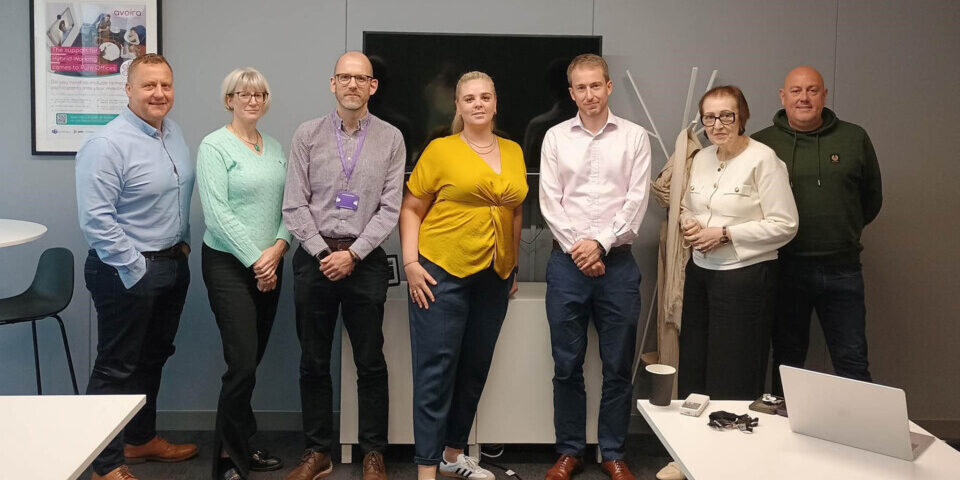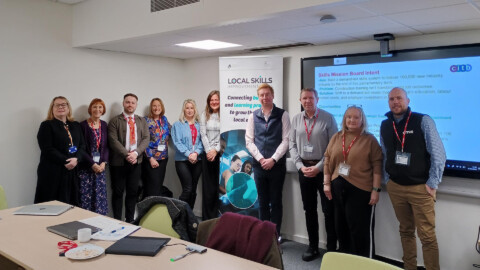Digital, Construction, Manufacturing and Education Skills round table
Held at Yorkshire Learning Providers, Leeds Bradford on Thursday 26th June
Attendees –
Katie Rigarlsford, West and North Yorkshire Chamber of Commerce
Alex Miles, Yorkshire Learning Providers
Ben Geldeard, Vensis
Warwick Andrews, Leeds Tykes
Mark Stow, Leeds Beckett University
Ewan Metcalfe, Icon Group
Lorraine Kirbitson, North Yorkshire Construction Training Group
Julie Cullen, Efficiency North
This, along with other skill roundtables are an integral part of hearing the employer voice on skills priorities as part of activity for the Local Skills Improvement Plan.
Skills shortage areas:
Digital, Manufacturing, Construction and Education are often cited as skills shortages in the local area. Today we brought employers together to hear their voice and look at potential solutions to increase skills provision in order to meet employer, community and economic needs.
Ben Geldeard, Vensis
Ben has recently taken over this 23-year-old small bespoke software business and a key challenge is attracting the right talent into the business. Ben is keen to develop the talent pipeline within the business and look at ways they can bring in and train up people with the right attributes and client facing skills. He hasn’t run apprenticeships previously but would look at this in the future and found the discussion useful to look at ways to develop links with local colleges and universities. Another option might be to recruit from local 16-week bootcamps run locally to help people transition into the industry.
Julie Cullen, Efficiency North
Efficiency North have various arms, and their support includes helping people develop[ skills in construction and retrofit. They support tenants and residents through council retrofit schemes. They are also keenly aware of the softer skills that people need to compliment the in-demand industry technical skills. They work with various partners in the North including Leeds College of Building and NHBC Construction Skills Hub. They represent the North for the shared Apprenticeship Scheme.
Ewan Metcalf, Managing Director, Icon Group
Icon Group support young people from disadvantaged backgrounds to develop a career in the Construction Industry, as well as delivering Construction Training Ewan delivers a social value consultancy for the Construction Industry.
Having overcome his own challenges Ewan now used boxing and education to help others develop better futures, changing lives in Construction. Ewan Runs Forging Futures Campus at Kirkstall Forge and is the process of developing a Green Skills Academy there, where he has access to 57 acres of ex-industrial brownfield site.
Ewan invests into diverse communities, training 60 construction students each year, through an aged 16+ study programme, helping to get people back into work and ensuring that they get their CSCS card and industry tickets ready for work.
The work Ewan does at Forging Futures is pioneering and they deliver a wide range of training, including skills bootcamps, working at height, asbestos, retrofit, timber frame, air type testing, sustainable drainage and more.
He is currently investing in building a Green Skills Training Hub and 80% of the students that they are training in Green Skills are going into green skills jobs, the demand is there. The project is supported by Leeds City Council but more can be done to support independent training providers to meet industry need, says Ewan.
Lorraine Kirbitson, North Yorkshire Construction Training Group
Lorraine works with a range of construction training groups, helping them to access funding and grants. They have identified a range of challenges and issues, including the quality of young people, even after completing a collage course.
Lorraine identified employability and transferable skills as still being a major challenge, and that this has been the case for a long time. Others around the table concurred that they had not seen any recent substantial changes to this. Identifying one way of overcoming the soft skills issues as being by trying to recruit through alternative routes, for example people with life experience.
Lorraine stated that “Employer skills needs can be immediate with a lack of forward planning to develop the skills pipeline”. The group concurred that more horizon gazing is required by businesses.
Lorraine works with specialist contractors who often struggle to recruit. She suggests an opportunity to open more mature candidates eyes to a broader range of careers opportunities.
The group addressed the question, is it skills or is it personal attributes which are the challenge?
Some suggestions included:
- Training people in a small group environment can make employability and industry links seem more real.
- There is not as much careers advice and influencing taking place anymore.
- Having younger people from the workforce going in to speak to students makes it more relatable to them. They can share how it really is.
- Employers get a bit disillusioned with apprenticeships. Some struggle with student’s attitude to learning and getting them to complete the course.
- Foundation apprenticeships may be useful for multi-trade but existing challenges will remain. However, foundation apprenticeships could potentially be delivered across several employers.
- Employers often lack understanding of what is needed to be ready to take on an apprentice.
Warwick Andrews, Leeds Tykes
Warwick was focused on sports and media / digital recruitment. They recruit sports graduates and also offer work experience. He stated that sometimes young people do not commit to understanding the needs of the job and that it can be challenging to recruit and retain undergraduates and graduates.
Recruiting for digital marketing, journalism and event management is a challenge and because their staff are in the early stages of their career they will often move on for higher salaries elsewhere.
Alex Miles, Yorkshire Learning Providers
Alex spoke about the challenge of younger people being under employed because they chose jobs that pay more now, rather than focusing on something that will help them develop their career in the longer term. This is perhaps due to increased focus on the gig economy and suggested that enhanced careers advice is needed to help young people plan for the longer term.
Warwick concurred that “there is a need to work between industry and educators to map careers, and perhaps work experience needs more structure”.
Mark Stow, Director of Business Engagement, Employability and Careers, Leeds Beckett University
Leeds Beckett is heavily invested in social impact and their Vice Chancellor chairs the Leeds Anchor Institution Network. They run an academic and student knowledge exchange and are currently looking closely at the government’s new industrial strategy. Their approach to business is quite agile and they try to be responsive to the needs of employers. He also emphasised that not everything relating to employability and skills is within the curriculum, lots happens outside it too, and they advise their academics on how to embed co-curricular activities too.
In response to employer skills needs they are currently setting up a FinTech skills bootcamp for graduates to get them ready for the sector, working in partnership with FinTech North. They are also linking with their school of education to try and address the FE tutor shortages by promoting teaching routes in this sector.
At the University their Access Participation Plan helps to address the equality and diversity agenda, and they have significant representation of students from lower socio-economic groups, ethnic minority groups and with 50% of their student population coming from the local area. They also work closely with employers to help them recruit a diverse workforce.
One of the challenges raised by the group however were around unexpected salary expectations of new graduates. The annual Highfliers Report suggests a graduate starting salary of £38,000, however that is not realistic for most small businesses. And there were concerns that with limited work experience some graduates do not understand their worth.
The group addressed the question how do we ensure industry in education?
Suggestions included:
- Employers are jaded as so much is asked of them and they are not necessarily looked after when they do engage. It would be great to have weekly industry speakers throughout education.
- It needs to be managed well and meaningful.
- Advice and guidance need improvement, for example including practitioners, employers and teachers.
- Careers often have to start right at the bottom
- Construction needs to sell itself better as a career with good prospects. It would be good to generate some good case studies of career success in construction. Not ‘you don’t want to end up like me’.
- Employers need a better understanding of transferrable skills from different disciplines.








